World War II and Bulgaria
The history of Bulgaria during the Second World War includes three periods: neutrality until March 1, 1941, a period of alliance with the Axis countries until September 9, 1944, and joining the USSR allies after September 9. Until the 90s in Bulgarian historiography, the participation of Bulgaria in the Nazi bloc was hushed up, and the alliance with the USSR was called the Patriotic War after the Soviet model. Now all this is openly discussed, and the events of September 9 are called the military communist coup.
Neutrality
After the Treaty of Versailles (1919), like other European countries, Bulgaria solved its territorial problems by paying reparations, reducing them and trying to bargain back at least something. Since she had no other ways than diplomatic, the government was very interested in friendship with neighbors. In the 30s, neutrality yielded its first fruits in the form of an exclusion from reparation debts. On July 31, 1938, together with Greece, Turkey, Romania and Yugoslavia, Bulgaria signed the Solun agreement, in which they agreed to refuse to fulfill certain military obligations under the 4th part of the Neuilly Treaty. From that moment, Bulgaria's foreign policy was subordinated to the desire for a peaceful revision.
The Kingdom of Bulgaria during World War II
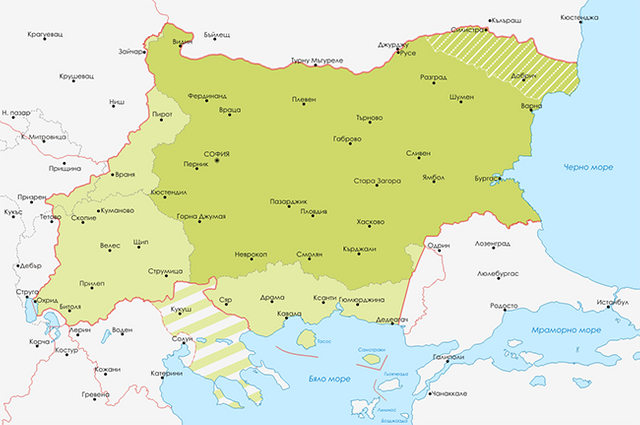
On September 30, 1938, the Munich Agreement was signed by the countries of England, Italy and France, thanks to which the Sudetenland was torn away from Czechoslovakia and became part of Nazi Germany. These events gave occasion to Bulgarian Tsar Boris III to think that Bulgaria will also be able to diplomatically achieve the return and correction of the borders of the Bucharest Treaty: South Dobrudzhia, Belomorskaya Thrace, Western Outskirts.
Exit from neutrality
In early September 1940, Bulgaria managed to agree with Romania on the return of Southern Dobrudzhia and again became convinced of the correctness of its policy of neutrality.
However, on September 27, 1940, Berlin signed the Triple Pact between Germany, Japan and Italy, after which direct pressure on Bulgaria began with Italy and Germany with a view to its accession to the Pact. On October 16, 1940, the German Minister Ribbentrop demanded that Sofia decide on his policy regarding the Covenant within two days. On the same day, Mussolini told the Bulgarian ambassador that Italy expects Bulgaria to be included in the upcoming war against Greece. Sofia realized that Italy and Germany did not have agreement on this issue, and this gave the Bulgarian government the opportunity to reject both proposals.
Two days before these events, Sofia was warned by the English king George VI that if Bulgaria were in the ranks of the opponents of the British Empire, then it would turn into a theater of operations. The United States also joined in a diplomatic attack on Bulgaria.
Bulgaria, meanwhile, strongly pulled and avoided direct answers and decisions on all these issues.
The USSR also actively participated in pressure on Bulgaria, seeking to obtain exclusive rights in the eastern Balkans. On November 12 and 13, 1940, Soviet Minister Molotov visited Berlin to obtain Hitler’s consent to provide Bulgaria with guarantees from the USSR, similar to the ones that Germany provided to Romania. The question arose about the Soviet military bases in Bulgaria. Hitler rejected this offer, but Molotov tried to achieve these goals by direct demarche in Sofia. A. Sobolev, the chief secretary of the Soviet Ministry of Foreign Affairs, arrived in the capital, who proposed concluding a pact on mutual assistance and recognition of the interests of the two countries in the Black Sea basin.
Sobolev’s proposal and his mission in Bulgaria were accompanied by a noisy campaign by the Communist Party, which collected signatures in support of the Soviet proposal. But the Bulgarian government was afraid of premature inclusion of the country in the war and
declined this invitation. Thus, the first attempt to join Bulgaria to the warring parties failed.
On August 23, 1939, the USSR and Germany concluded the Molotov-Ribbentrop Pact, that is, the "Non-aggression pact between Germany and the Soviet Union."
It became clear to Bulgarian diplomacy that they could continue their policy of neutrality. However, in the spring of 1940, German troops defeated their opponents in Western Europe in a few days and faced Southeast Europe.
Joining the axis of Rome-Berlin
At the end of 1940, the Bulgarian Agricultural People’s Union (BZNS Pladne) invited the Bulgarian Communist Party (BRP) to launch an armed uprising against the authorities in the country. The aim was to restore democracy and prevent a hypothetical connection with Hitler Germany. The BRP Central Committee rejected this offer because of a connection with the Comintern, backed up by the Molotov-Ribbentrop Pact. In January 1941, the BZNS organized an impressive campaign against the preparations for the accession of Bulgaria with the Triple Pact and began preparations for a coup in the country - together with the British special services. However, the plot was uncovered.
In the spring of 1941, the Greeks defeated the Italians in the Italo-Greek War (October 28, 1940 - April 23, 1941) and Germany had to intervene to save its Italians allies. German troops had to go south through Bulgaria. In another attempt to gain time, the Bulgarian government began to insist on simultaneous entry into Yugoslavia, explaining that the Greeks built a fortified Metaxa line on the Bulgarian border, while the border between Greece and Yugoslavia was not strengthened. Immediately after Belgrade agreed to join the Pact and on the assumption that there were German troops in Romania who could not wait long for the corridor to Greece, Bulgaria joined the pact.
On March 1, 1941, Minister Bogdan Filov signed in Vienna the accession of Bulgaria to the Tripartite Pact, which promised Bulgaria access to the White Sea (Aegean). On the same day, Wehrmacht troops began to enter the country and deployed on the southern side of the border. At the same time, British and American diplomats left the country.
German officers in Bulgaria
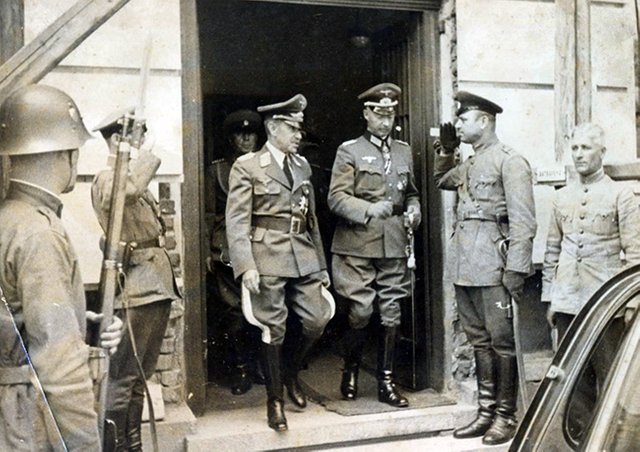
On March 2, 1941, an extraordinary session of the National Assembly was convened, at which its chairman Logofetov emphasized the importance of the German-Russian Union Treaty for the inclusion of Bulgaria in the pact:
"We are Bulgarians, formally and actually found a common language with our hearty friends Germans, Italians and their ally Japan, without violating our traditional and sincere friendship with the Russian people, a friend of the Axis forces."
Minister Filov in a government declaration, emphasizing that Bulgaria actually joined the then-Soviet-German union, said:
"We believe that the pact that we signed does not violate the agreements we have with our neighbors and that we must continue our policy of traditional friendship with the Soviet Union."
The Kingdom of Hungary has been a minor member of the Axis countries since April 6, 1940, Romania since June 22, 1941, the Kingdom of Yugoslavia signed the Tripartite Pact on March 25, 1941, but two days later riots broke out in Belgrade that led to a coup and in fact brought country from this contract.
Participation in hostilities
In these circumstances, Germany changed plans and on April 6 started a war simultaneously against Greece and Yugoslavia. She was supported by Italy and Hungary, but failed to secure the support of Bulgaria. Despite several Yugoslav bombings of Sofia, Bulgaria did not respond. Once again she avoided a direct military clash. However, after the defeat of Yugoslavia and Greece, in which Bulgaria did not participate, she wished to control the territory of Vardar Macedonia. Tsar Boris urgently requested an audience with Hitler, which took place on April 18 and, as a result, an agreement was reached on which Bulgaria gained control of Pomorie and Vardar Macedonia to the Vardar River, although the king also wanted to get the western parts of this territory (Ohrid).
Bulgarian military units occupy a Greek village in April 1941
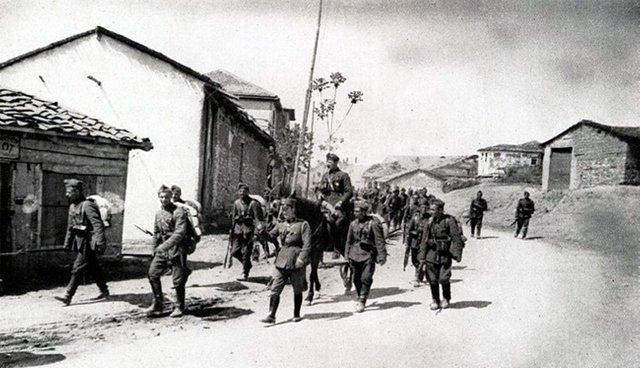
Thus, Bulgarian troops entered Yugoslavia on April 19, and Greece on April 20 without obligation to conduct active hostilities. Later, other territories were transferred to the Bulgarians. As a result, most of the Vardar
Macedonia, Eastern Aegean Macedonia, Western Thrace, Western Outskirts and Pomeravia. According to the so-called "Dr. Clodius" treaty, Bulgaria temporarily replaced German troops in the territories of Macedonia, Moravia and Western Thrace. The Bulgarian army had only security functions. Expecting later to get them into possession, Bulgaria began to build schools, hospitals, railway stations and lay railway tracks on these lands.
Bulgarians behaved peacefully everywhere except Greece - there Bulgaria surpassed Germany and Italy, destroying 40,000 Greeks. The reason was the dictatorial regime of the Greek general Joanis Metaksas in 1936, which forbade the Bulgarians living in these territories from their national identity: it was impossible to speak their own language not only in public places, but also at home among themselves. Those who did not want to learn Greek were brutally repressed. The Bulgarians did not forgive this.
In addition to all this, the Germans demanded that Bulgaria deploy its troops to Serbia in order to liberate the Balkan forces of the Wehrmacht for a throw to the Eastern Front. Therefore, in January 1942, Bulgarian troops entered Serbia.
Relations with the USSR
Ukrepiv svoi pozitsii na Balkanakh, Gitler nachal svoyu kampaniyu protiv SSSR. 22 iyunya 1941 goda voyska Vermakhta pereshli granitsy Sovetskogo Soyuza.
Nesmotrya na to, chto Bolgariya v etoy situatsii okazalas' soyuznikom Germanii, ona ne prekrashchala diplomaticheskikh otnosheniy s SSSR i ne otpravila regulyarnyye voyska na Vostochnyy front. Tsar' Boris ne pozvolyal otpravit'sya na etot front dazhe legionu dobrovol'tsev, pernebregaya tem, chto v germanskoye posol'stvo v Sofii postupilo poltora milliona zayavleniy ot bolgarskoy molodezhi, zhelayushchey borot'sya protiv bol'shevizma.
Srazu posle nachala voyny na Vostochnom fronte, bolgarskiye kommunisty vzyali kurs na vooruzhennuyu bor'bu. V Bolgarii ona byla napravlena protiv pravitel'stva. Odnako bolgarskoye pravitel'stvo sil'no podderzhivalos' naseleniyem, potomu chto sniskalo sebe uvazheniye blagodarya poslednim rezul'tatam v politike: ne otpravleniyu svoikh voysk na Vostochnyy front i prisoyedineniyu utrachennykh raneye territoriy, na kotorykh prozhivali bolgary.
7 dekabrya 1941 goda Kanada, Avstraliya i Novaya Zelandiya ob"yavili voynu Tsarstvu Bolgariya. V otvet na eto bolgarskiy parlament prinyal deklaratsiyu ot Velikobritanii, pravda sumel
uklonit'sya ot ob"yavleniya voyny SSSR i sokhranit' diplomaticheskiye otnosheniya do tekh por, poka Sovetskiky Soyuz sam ne ob"yavil voynu Bolgarii - 5 sentyabrya 1944 goda. Vse eto dalo povod Anglii nachat' bombardirovki Sofii, Dupnitsy, Skopiye, Stara Zagory, Kazanlyka, Vratsy, Gorno Oryakhovitsy, Nisha i Karlovo. Bol'she vsekh postradala Sofiya – istoricheskiy tsentr goroda byl unichtozhen na 90%.
Having strengthened his position in the Balkans, Hitler began his campaign against the USSR. June 22, 1941 Wehrmacht troops crossed the borders of the Soviet Union.
Despite the fact that Bulgaria in this situation was an ally of Germany, it did not stop diplomatic relations with the USSR and did not send regular troops to the Eastern Front. Tsar Boris did not allow even a legion of volunteers to go to this front, neglecting the fact that the German embassy in Sofia received one and a half million statements from Bulgarian youth who wanted to fight against Bolshevism.
Immediately after the outbreak of war on the Eastern Front, the Bulgarian Communists headed for armed struggle. In Bulgaria, she was directed against the government. However, the Bulgarian government was strongly supported by the population, because it gained respect due to the latest results in politics: not sending troops to the Eastern Front and annexing previously lost territories in which the Bulgarians lived.
On December 7, 1941, Canada, Australia, and New Zealand declared war on the Kingdom of Bulgaria. In response, the Bulgarian parliament adopted a declaration from the UK, although it managed
to avoid declaring war on the USSR and preserve diplomatic relations until the Soviet Union itself declared war on Bulgaria on September 5, 1944. All this gave rise to England to begin the bombing of Sofia, Dupnitsy, Skopje, Stara Zagora, Kazanlak, Vratsa, Gorno Oryahovitsy, Nis and Karlovo. Sofia suffered the most - the historic center of the city was destroyed by 90%.
Sofia during the Anglo-American bombing
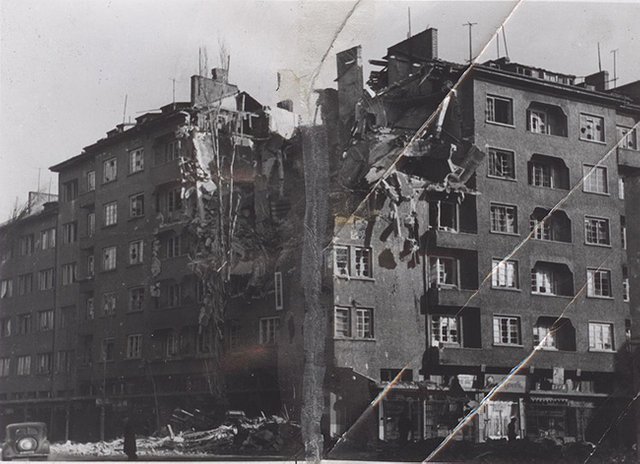
In August 1943, Tsar Boris III suddenly died. The heir to the throne was his son Simeon II, who could not rule in his infancy. Regents elected Bogdan Filov, Nikola Mikhov and Prince Cyril.
At the same time, the struggle between the Communists and the partisan movement in the country intensified, the Red Army approached the borders of Bulgaria, the pressure of Moscow increased and on May 18, 1944 the Soviet government handed a sharp note to Bulgaria demanding to immediately cease its alliance with Germany. On the same day, the cabinet resigned in order not to give a definitive answer. An interim government of Ivan Bagryanov was created.
Bulgaria on the side of the USSR
On August 26, 1944, under the threat of the advancing Red Army, the government of Ivan Bagryanov declared the neutrality of Bulgaria in the war between Germany and the Soviet Union. This obliged the German troops to leave the country or disarm. Despite this, the USSR declared war on the Kingdom of Bulgaria on September 5, 1944, but the new Bulgarian government (Kontantina Muravieva) declared war on Nazi Germany on September 8, 1944, and on the same day the USSR troops entered the country. Muraviev was overthrown and the next day the September 9 coup d'état took place in the country.
Until September 44, the Bulgarian army did not participate in large-scale hostilities and did not go far from its borders. The plans of the Soviet High Command were to use fresh Bulgarian forces in military operations, therefore, after the Moscow Armistice on October 28, 1944, Bulgaria began to operate in the territories of Macedonia, Eastern Serbia and Kosovo. In the first phase, Bulgaria participated with three armies - the First, Second and Fourth, and the Third Army was not included in the operations against the Third Reich,
because she stayed in Turkey. By October 1, 1944, the total number of the Bulgarian army reached about 445,000.
In the first days after September 9, Bulgarian forces, together with partisans and Soviet units, repelled the advance of German troops in the direction of Kyustendil - Sofia.
On September 18, the Bulgarian army became operational subordinate to the commander of the III Ukrainian Front, Marshal Tolbukhin. The Bulgarian army was renamed the Bulgarian National Army and, together with parts of the Ukrainian front, carried out the task of strengthening the left flank of the Red Army in order to cut off the path to the retreat of Group E of the German army from Greece.
From October 8 to October 14, Bulgarian forces defeated the 7th SS division in Nis; On November 30, the Kosovo operation was completed and the first phase of the war ended for Bulgaria.
Bulgarian tank in Hungary
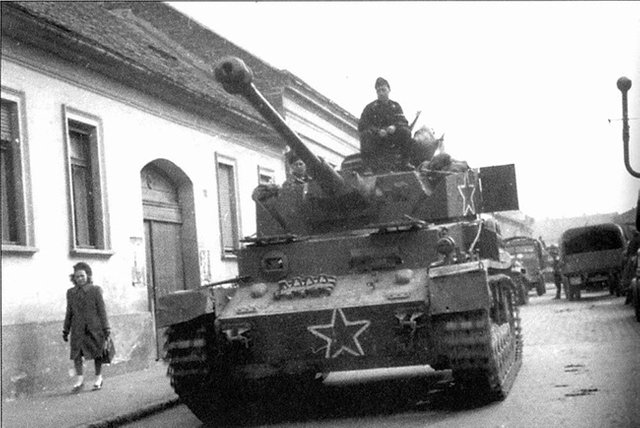
The second phase began in December 1944 and lasted until May 1945. At this time, the Bulgarian army participated in the liberation of Northern Yugoslavia and entered southern Hungary and eastern Austria, conducted the Drava operation and the Mur operation. The last battles with German troops were fought in Austria. The surrender of Nazi Germany found the Bulgarian troops at the foot of the Austrian Alps, where they continued to fight until May 15 - until the complete defeat of the Germans.
Tank Skoda LT 35th Armored Brigade in Sofia (1944)
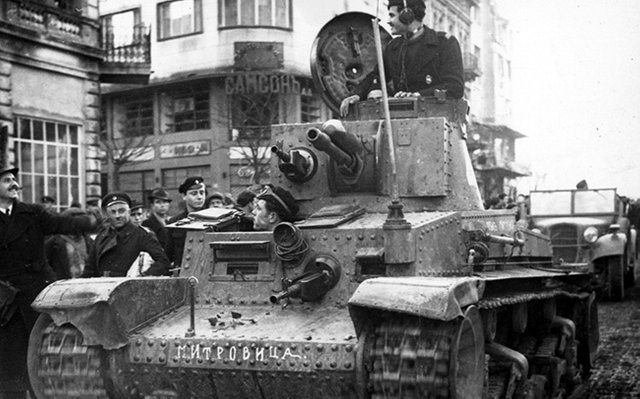
Effects
After May 1945, Bulgaria fell under the Soviet sphere of influence. On September 8, 1946, in the presence of Soviet troops, a referendum was held in Bulgaria, after which the country was declared a "people's republic" and the monarchy was abolished. New Minister
Chairman Georgi Dimitrov began a policy of a gradual transition to a communist model of governance.
After signing the peace treaty at the Paris Conference in 1947, Bulgaria lost its territory and returned to the borders that existed before the signing of the Tripartite Pact.
After 1948, Bulgaria turned into a satellite of the USSR.
Thank you for your time and attention.
Follow me for more content to come!
[//]:# (!steemitworldmap 42.643223 lat 23.365837 long d3scr)
With love from Bulgaria @varya-davydova
Congratulations, Your Post Has Been Added To The Steemit Worldmap!
Author link: http://steemitworldmap.com?author=varya-davydova
Post link: http://steemitworldmap.com?post=world-war-ii-and-bulgaria
Want to have your post on the map too?
Hiya, @lizanomadsoul here, just swinging by to let you know that this post made into our Honorable Mentions in Daily Travel Digest #595.

Your post has been manually curated by the @steemitworldmap team. If you like what we're doing, please drop by to check out all the rest of today's great posts and consider upvoting and supporting us.